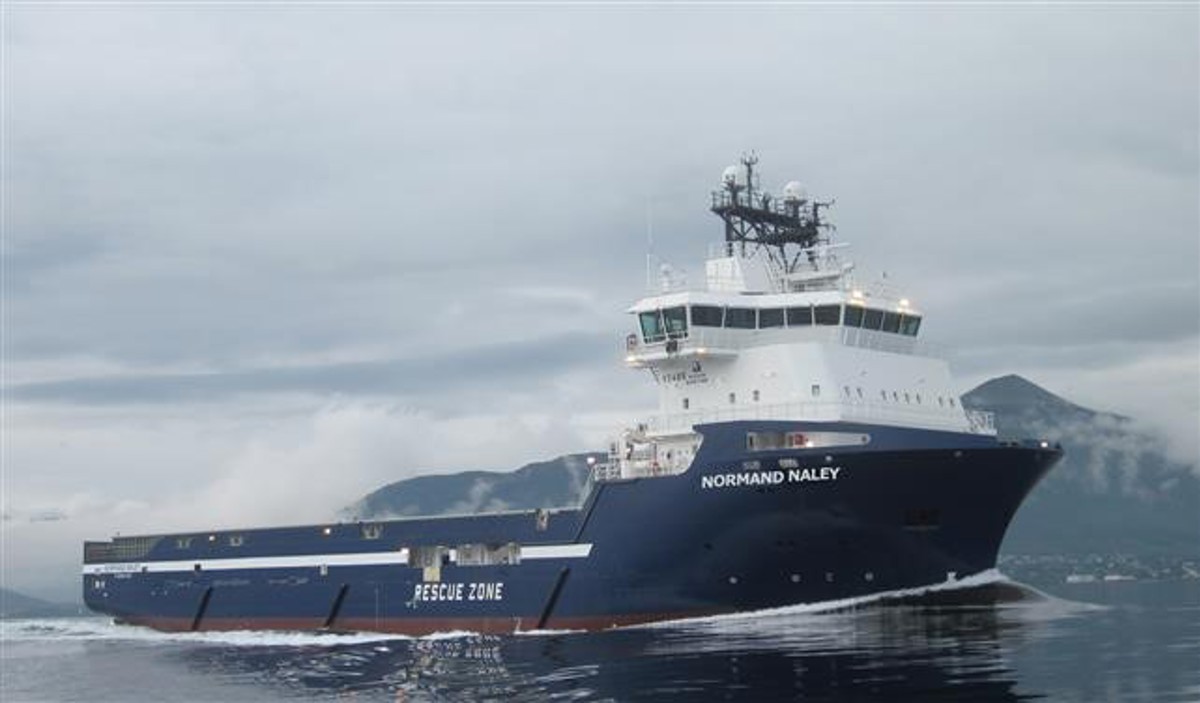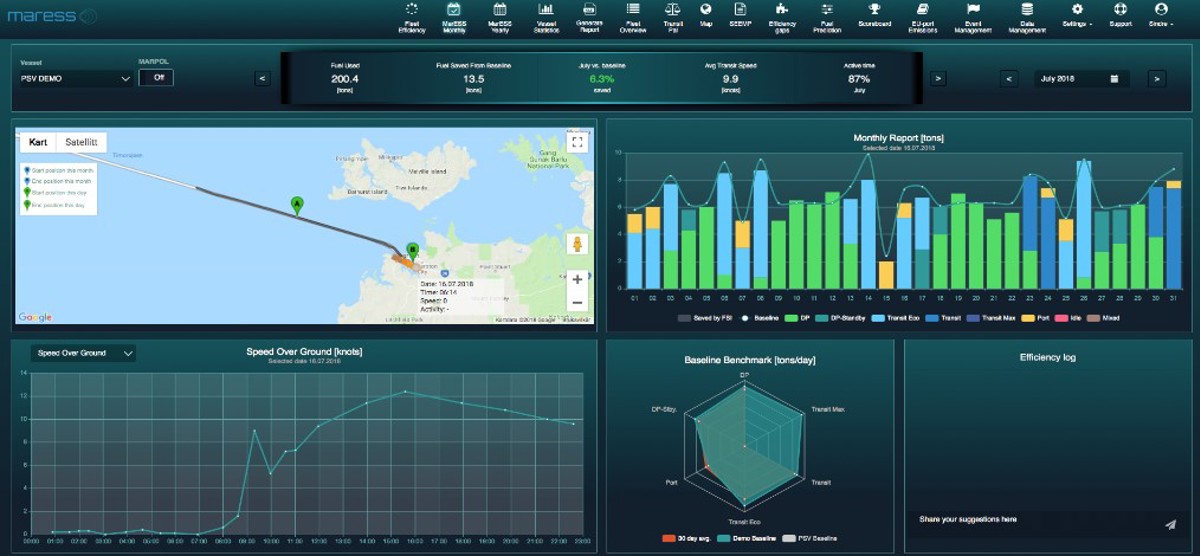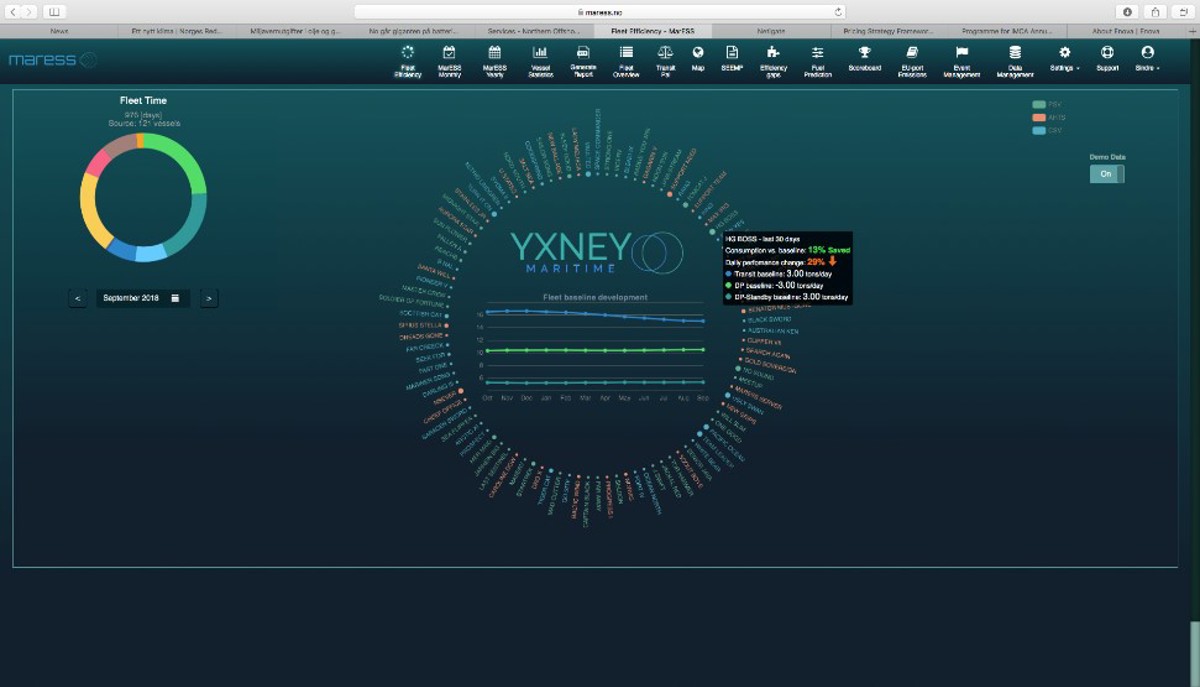IN 1440 – Lower emissions and a stronger bottom line through data analytics
- Information Note
- Published on 5 June 2019
- 4 minute read
Jump to:
This is the third IMCA Environmental Sustainability bulletin, and like the first two, it is drawn from one of the nominations for the inaugural IMCA Environmental Sustainability Awards made at the IMCA Annual Seminar in Den Haag, Netherlands, in November 2018.
It covers active pursuit of improvements to efficiency, through energy management. This initiative of Solstad Offshore ASA, began in 2009 and has led to an 18% fuel saving across a fleet of 147 advanced Offshore Supply Vessels.
1. What was done?
Solstad Offshore entered a partnership with software company Yxney Maritime, with the intent of using software monitoring to increase the fuel efficiency of its offshore fleet. Yxney developed cloud-based energy efficiency visualisation software that could be swiftly implemented across the fleet without any hardware installation or CAPEX.
By utilizing Yxney’s software to underpin efficiency efforts, Solstad Offshore was able to reduce the total footprint from its operations by more than 18,000 tons of CO2 in the first eight months of 2018 and shaved the fuel consumption of the fleet by 18%. Efficiency gains achieved have resulted not only in significant emissions reductions, but also a stronger financial bottom line – all while maintaining an uncompromised level of operational safety.

2. What were the challenges?
Monitoring fuel efficiency measures in an offshore fleet is challenging due to the complexity of operations and unique operational patterns. The software used provides a new way of combining data from a variety of sources and presents the user with actionable information and an overview of the performance of the entire fleet as well as individual vessels. A unique strength in the software is the ability to create a historic baseline for each vessel for all operational modes – previously challenging and often a showstopper for effective energy management. The daily performance of the vessel can now be compared against the baseline adjusted for the actual operational pattern to identify deviances and sub-optimal operations.
3. How did the improvement come about?
The collaboration between the two companies was established in a project where the data stream from 13 vessels was analysed to identify the vessels´ fuel efficiency in different scenarios. The analysis was used as a foundation to come up with new Fuel Saving Initiatives, or “SGOs” (Solstad Green Operations, where 1 SGO equals 500 litres or 0.5 m3 of saved fuel). New SGOs identified were; efficient ways of waiting on weather; efficient thruster biasing in calm weather; lean initiatives such as actively coordinating with clients for best speeds; and appointing one person on each vessel to be responsible for SGOs.
The power of data driven decision making needs to go hand in hand with a company culture rewarding efficient operations. The software used was designed to promote rapid learning and was achieved through close dialogue between those onboard and the development team. For both Yxney and Solstad Offshore it is important that the software is indeed a tool for the crews, incentivising the sharing of best practices. Extraordinary results are only truly realised through the attention and well-informed efforts of the crew onboard.

Analytics software comparing historic baseline against performance across the full range of operations of a vessel. Photo: Yxney Maritime.
4. What was the final result?
The fuel and emission saving potential proved to be huge, and the two companies have since collaborated on new projects to remove both direct and indirect inefficiencies in the operations, resulting in a 10% improvement in one of the projects alone.
Solstad in a recent merger went from 35 to 147 vessels and needed a solution to perform effective energy management without scaling up the administrative staff onshore. The solution has been to use this software to change the way their teams communicate, and to ensure that both crews and support staff work together, towards boat-specific goals. Solstad Offshore is now also able to interact with clients in new ways by providing real-time access to data relevant for reporting and fuel incentive schemes.

A dynamic fleet overview showing actionable data and an intuitive user interface. Photo: Yxney Maritime
This project has been partly financed by Enova SF (owned by the Norwegian Ministry of Climate and Environment) whose mandate is contributing to reduced greenhouse gas emissions and the development of energy and climate technology.